From Fast Jets to First Principles
The Thursday War......
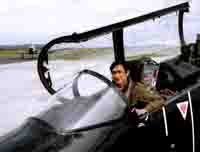 It was actually on a Tuesday in early September when I was privileged
to fly with the sleek, black-painted BAe Hawks at RNAS Culdrose in Cornwall.
The fleet, owned by the Royal Air Force, yet flown and maintained by
civilians on behalf of the Royal Navy, is known as the FRADU(Fleet Requirements
and Air Direction Unit) Hawks. Pilots come from a variety of backgrounds,
but all are experienced fast-jet operators, with the Hawk, Tornado, Jaguar
and Sea harrier predominantly in their logbooks. Its most important role
is to fly simulated attack profiles against RN and NATO ships in order
to train weapon systems operators. It was actually on a Tuesday in early September when I was privileged
to fly with the sleek, black-painted BAe Hawks at RNAS Culdrose in Cornwall.
The fleet, owned by the Royal Air Force, yet flown and maintained by
civilians on behalf of the Royal Navy, is known as the FRADU(Fleet Requirements
and Air Direction Unit) Hawks. Pilots come from a variety of backgrounds,
but all are experienced fast-jet operators, with the Hawk, Tornado, Jaguar
and Sea harrier predominantly in their logbooks. Its most important role
is to fly simulated attack profiles against RN and NATO ships in order
to train weapon systems operators.
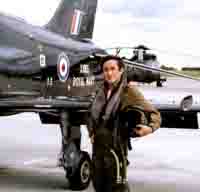 Having arrived the day before, I was put through a careful medical
checkup to ensure I was physically up to the stresses of fast-jet
flight, then
sent off to be measured and fitted equally carefully with helmet,
oxygen mask, G-suit and other pilot paraphernalia. This was rounded
off with
a quick, grim instructional on emergency ( ejection )procedures.
I was also reminded to always have a visor down over my eyes, for
added
protection
in case of bird strike ( "you won't paint very well without your
eyes, Ron…")! We roared off on time in the early afternoon…..with
me in the rear seat…. quickly gaining operational height( 19,000
ft ) and panoramic views over the western extremities of Cornwall. Having arrived the day before, I was put through a careful medical
checkup to ensure I was physically up to the stresses of fast-jet
flight, then
sent off to be measured and fitted equally carefully with helmet,
oxygen mask, G-suit and other pilot paraphernalia. This was rounded
off with
a quick, grim instructional on emergency ( ejection )procedures.
I was also reminded to always have a visor down over my eyes, for
added
protection
in case of bird strike ( "you won't paint very well without your
eyes, Ron…")! We roared off on time in the early afternoon…..with
me in the rear seat…. quickly gaining operational height( 19,000
ft ) and panoramic views over the western extremities of Cornwall.
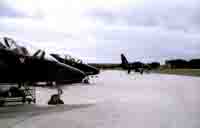 In the peaceful, sunlit skies we soon met up with another Hawk and a
pair of blue FR Aviation Falcon 20s out of Bournemouth, and the exercise
began in earnest. Bristling with antennae and underwing pods containing
electronic warfare threat simulators, they can jam radars and communications
systems or simulate hostile aircraft and missile radars. Over the following
hour and a half we would repeatedly drop down from on high and skim across
the wide ocean until the grey silhouettes of cruisers and destroyers
would suddenly appear ahead of us. One could almost see their crews at
Action Stations scrambling to bring their defensive systems to bear on
the incoming missile and/or hostile aircraft threat their sensors were
registering. The ships that day seem to have been mainly German and Dutch
Navy, and we were simulating anti-shipping attacks by Sukhoi SU-24 Fencers.
We would roar over them triumphantly at little more than mast height,
sometimes waggling our wings in salute. In the peaceful, sunlit skies we soon met up with another Hawk and a
pair of blue FR Aviation Falcon 20s out of Bournemouth, and the exercise
began in earnest. Bristling with antennae and underwing pods containing
electronic warfare threat simulators, they can jam radars and communications
systems or simulate hostile aircraft and missile radars. Over the following
hour and a half we would repeatedly drop down from on high and skim across
the wide ocean until the grey silhouettes of cruisers and destroyers
would suddenly appear ahead of us. One could almost see their crews at
Action Stations scrambling to bring their defensive systems to bear on
the incoming missile and/or hostile aircraft threat their sensors were
registering. The ships that day seem to have been mainly German and Dutch
Navy, and we were simulating anti-shipping attacks by Sukhoi SU-24 Fencers.
We would roar over them triumphantly at little more than mast height,
sometimes waggling our wings in salute.
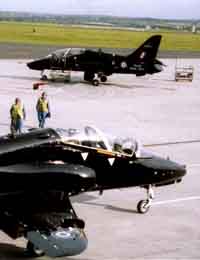 Visibility was excellent out of that big Hawk cockpit. At times pressed
into the seat by G-forces, and at other times dangling upside down by
my seat straps, but always surrounded by magnificent vistas of sea and
sky, I thoroughly enjoyed the experience, and never once needed the pair
of vomit bags thoughtfully clipped to the dash in front of me. Every
time the G-suit automatically clamped tight( as the dramatic vortices
trailed off the wings to either side of me ) I would instinctively contract
my abdominal muscles. An old Karate reflex perhaps, but I was told it
was the correct thing to do! Visibility was excellent out of that big Hawk cockpit. At times pressed
into the seat by G-forces, and at other times dangling upside down by
my seat straps, but always surrounded by magnificent vistas of sea and
sky, I thoroughly enjoyed the experience, and never once needed the pair
of vomit bags thoughtfully clipped to the dash in front of me. Every
time the G-suit automatically clamped tight( as the dramatic vortices
trailed off the wings to either side of me ) I would instinctively contract
my abdominal muscles. An old Karate reflex perhaps, but I was told it
was the correct thing to do!
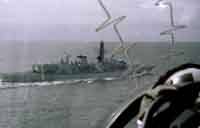 Back on the ground the painting and prints commissioned by the unit
were presented the following day. Titled "The Thursday War", the
painting(see below) depicts a four-ship simulated attack on HMS Cornwall, a Type
22 Frigate, with FRADU Hawks crossing over the ship from different directions
and stacked at different heights…..roughly 100, 300, 500 and
700 feet. The rest of my brief visit was pleasantly spread between
the pubs
and sea food restaurants of Cornish villages, and long walks along
the picturesque but blustery Atlantic coast. Back on the ground the painting and prints commissioned by the unit
were presented the following day. Titled "The Thursday War", the
painting(see below) depicts a four-ship simulated attack on HMS Cornwall, a Type
22 Frigate, with FRADU Hawks crossing over the ship from different directions
and stacked at different heights…..roughly 100, 300, 500 and
700 feet. The rest of my brief visit was pleasantly spread between
the pubs
and sea food restaurants of Cornish villages, and long walks along
the picturesque but blustery Atlantic coast.
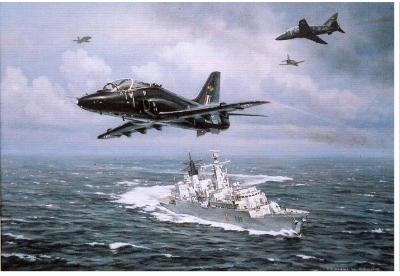
.....and The Wright Stuff
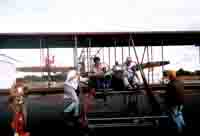 A couple of weeks afterwards I found myself in Dayton, Ohio for the second
time this year, this time courtesy of the 20th Fighter Wing Association
2003 Reunion. As Guest Speaker at the Banquet held at the sumptuous
Crowne Plaza Hotel, I gave an illustrated talk on my work with the assistance
of projector and screen to a packed audience. In spite of the busy
(
and highly enjoyable) schedule I was able to fit in a flight on a
1911 Wright "B" Flyer( an obvious advance on the original 1903 machine,
and more akin to the Farman which made the first powered flight in
Hong Kong in 1911 )! In the few minutes we were in the air I rudely discovered
the meaning of not having a cockpit and fuselage between you and
the
elements, even on a calm, sunny day at about 50 mph! The other thing
I was keenly aware of was that busy motor and those large, chain-driven
(counter-rotating!) prop blades pressing us forward, all just behind
my bum. One would not wish for anything to suddenly halt the forward
motion of the fragile contraption..... A couple of weeks afterwards I found myself in Dayton, Ohio for the second
time this year, this time courtesy of the 20th Fighter Wing Association
2003 Reunion. As Guest Speaker at the Banquet held at the sumptuous
Crowne Plaza Hotel, I gave an illustrated talk on my work with the assistance
of projector and screen to a packed audience. In spite of the busy
(
and highly enjoyable) schedule I was able to fit in a flight on a
1911 Wright "B" Flyer( an obvious advance on the original 1903 machine,
and more akin to the Farman which made the first powered flight in
Hong Kong in 1911 )! In the few minutes we were in the air I rudely discovered
the meaning of not having a cockpit and fuselage between you and
the
elements, even on a calm, sunny day at about 50 mph! The other thing
I was keenly aware of was that busy motor and those large, chain-driven
(counter-rotating!) prop blades pressing us forward, all just behind
my bum. One would not wish for anything to suddenly halt the forward
motion of the fragile contraption.....
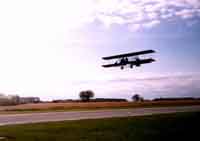 On the return flight to London from Dayton I stopped over at Washington
DC to meet up with some long lost Hong Kong schoolmates( class of
'58 ) now resident on the Eastern Seaboard of the US. Among many
other
things I at last stepped inside the renowned Smithsonian Air and
Space Museum(
accompanied by an old schoolmate who is a dean of the MIT, and another
who is ex-CIA!). Something of an anticlimax in terms of capacity
and content after the vast and overflowing USAF Museum at Wright-Patterson,
but made up for by some fascinating displays on the missile and space
exploration side. That erect Soviet SS-20 ICBM from the Cold War
era
for instance, in khaki camouflage and with its unique cluster design
of multiple warhead ( anyone watch that monster thriller "Tremors"?),
positively exuded evil intent! On the return flight to London from Dayton I stopped over at Washington
DC to meet up with some long lost Hong Kong schoolmates( class of
'58 ) now resident on the Eastern Seaboard of the US. Among many
other
things I at last stepped inside the renowned Smithsonian Air and
Space Museum(
accompanied by an old schoolmate who is a dean of the MIT, and another
who is ex-CIA!). Something of an anticlimax in terms of capacity
and content after the vast and overflowing USAF Museum at Wright-Patterson,
but made up for by some fascinating displays on the missile and space
exploration side. That erect Soviet SS-20 ICBM from the Cold War
era
for instance, in khaki camouflage and with its unique cluster design
of multiple warhead ( anyone watch that monster thriller "Tremors"?),
positively exuded evil intent!
And yes, that famous B-17 mural by Keith Ferris is still there in all
its glory.
Ronald Wong GAvA
10 Oct 2003
|
